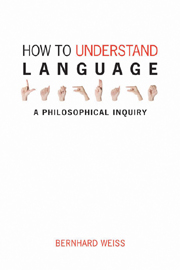Book contents
- Frontmatter
- Contents
- Preface
- 1 The puzzles of language
- 2 The starting-point for analysis
- 3 Analysing sentence-meaning
- 4 Analysing synonymy
- 5 Radical translation
- 6 The structure of a theory of meaning
- 7 Radical interpretation
- 8 Linguistic norms, communication and radical interpretation
- 9 Linguistic normativity
- 10 Radical or robust?
- 11 Language and community
- 12 Rules and privacy: the problem
- 13 Rules and privacy: the solution?
- 14 Truth-conditions versus use-conditions
- Notes
- Bibliography
- Index
10 - Radical or robust?
- Frontmatter
- Contents
- Preface
- 1 The puzzles of language
- 2 The starting-point for analysis
- 3 Analysing sentence-meaning
- 4 Analysing synonymy
- 5 Radical translation
- 6 The structure of a theory of meaning
- 7 Radical interpretation
- 8 Linguistic norms, communication and radical interpretation
- 9 Linguistic normativity
- 10 Radical or robust?
- 11 Language and community
- 12 Rules and privacy: the problem
- 13 Rules and privacy: the solution?
- 14 Truth-conditions versus use-conditions
- Notes
- Bibliography
- Index
Summary
The mysteriousness of language
I have argued that radical interpretation is an essential ingredient in Davidson's framework for three reasons. The first is that the broadly extensionalist approach of the radical interpreter promises to shed light on the intensionality of language. The point is worth reprising in the context of Dummett's (1993: essay 1) discussion of Davidson. Recall that, at a certain stage, Dummett complains about the triviality of a Davidsonian meaning-theory, which he takes to be modest and thus philosophically no more interesting than a translation manual. The complaint is surely just if you view a Davidsonian meaning-theory simply as the interpretative scheme given by the T-theory. But, as Dummett comes to realize, the complaint seems to miss its mark. Davidson hopes for philosophical illumination not simply from the T-theory but from the T-theory given its mode of construction, that is, given that it is the product of radical interpretation. When we look at things from this angle, the triviality of a homophonic T-theory is likely to be welcomed – given its clear correctness – as confirming the methodology of radical interpretation. Whether Dummett is right to factor in the import of the radical interpreter's methods in quite the way that he does – by making the precise set of sentences held true part of what the interpreter knows in knowing how to interpret speakers – is a question we can side-step for now; the fact remains that it is only when we wed a T-theory to the fact that it is the product of radical interpretation that Davidson manages to shed light on meaning.
- Type
- Chapter
- Information
- How to Understand LanguageA Philosophical Inquiry, pp. 155 - 172Publisher: Acumen PublishingPrint publication year: 2009



